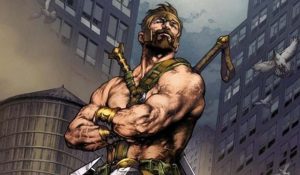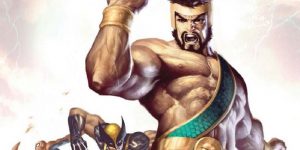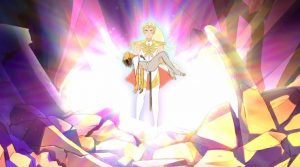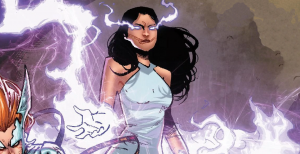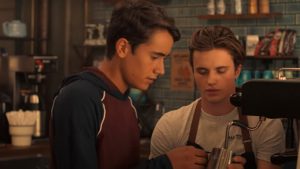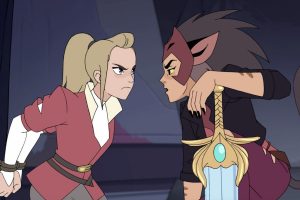SPOILERS FOR LOKI AHEAD!
I can’t tell what’s more mind-boggling to me: that in a single night, the Marvel Cinematic Universe went from having precisely zero canonically queer characters (leaving aside Gay Joe Russo because I will do literally anything in my power to expunge that atrocity from my mind) to having not one, but two whole canonically bisexual characters, or that it took thirteen years to do what ultimately cost Loki (Tom Hiddleston) only about ten seconds in today’s episode of Loki – confirm, in a single line of dialogue, that he’s attracted to both men and women.

And yeah, thirteen years is a long time to wait, but take into account the fact that Loki has been depicted as queer in Norse mythology for literal centuries, and the MCU is alarmingly late to the party. The perfect time to organically reveal Loki’s bisexuality in the movies was ages ago – at the very least in Thor: Ragnarok, where the sexual tension between Tom Hiddleston and Jeff Goldblum was so palpable you could feel it even without the script slyly hinting that Loki had seduced Goldblum’s Grand Master, or vice versa. But remember Marvel’s excuse for why a single shot of a woman exiting Valkyrie’s bedroom had to be cut from that film, thereby entirely erasing the only hint of that character’s bisexuality? Because it was “distracting”.
Apply that same faulty logic to all instances of queerness, and it’s no wonder why Loki had to be three episodes deep in his own solo TV series before he could even so much as address his sexuality, with a line straight out of Shadow And Bone bicon Jesper Fahey’s playbook: “A little bit of both.” My hope is that, in the near future, it won’t have to take this long before Marvel characters can be queer upfront instead of having to Trojan Horse their way into audiences’ hearts for decades: and the fact that the writer of today’s episode, Bisha K. Ali, is also presiding over the writers room for the upcoming Ms. Marvel series (as concerning as some of that show’s casting choices have been) is a promising sign. I also hope that Loki director Kate Herron is able to return to the MCU after this series is completed.
And while fans had been hoping for Loki to be confirmed as queer for years because it was just the logical thing to do, I also appreciate that Marvel took an additional tentative step forward, and did the same for Sylvie Laufeydottir (Sophia Di Martino), whom last week we only knew by the title of “Lady Loki” – a title I will no longer be using for her, since it’s become abundantly clear that while she appears to be a Loki Variant, she doesn’t identify with him or many of his experiences. But like Loki, she does seem to be queer – or at least Loki says he suspects as much, and she doesn’t argue the point. It’s hard to say if that makes her canonically queer or not…kind of?
But yeah, apart from (possibly) being bi and doing crimes, Sylvie actually has surprisingly little in common with Loki. The exact details of where/when she came from, who raised her, and why the TVA wants to eradicate her from existence are still unclear, but we got a couple of hints. She was adopted, like Loki, but her adoptive parents never hid that from her. Crucially, she doesn’t seem to have had a strong relationship with her mother – which shocks Loki, given how instrumental he considers Frigga to be in nurturing his talents from a young age when Odin regarded him as a hostage rather than a son. Sylvie therefore learned magic on her own, and seems to have tapped into a vein of chaos magic that allows her to manipulate minds much like Wanda Maximoff.
Lastly, it seems she chose to live permanently as Sylvie, as evidenced by her telling Loki that she doesn’t use his name “anymore”. So the character’s gender-fluidity is apparently an element in the story, and not just on literal paper. But Sylvie mentions that the Time Variance Authority has been hunting her for her entire life, meaning she varied from the confines of the Sacred Timeline at a very young age, perhaps when she chose to live as a woman. If that’s the case, it’s no wonder why she’d get so angry at Loki for calling her by his name. It would also explain why she’s going after the mysterious Time-Keepers who supposedly preside over the TVA – because what right do they have to judge who gets a place in the Sacred Timeline, and who doesn’t? We know other timeline alterations have been authorized by the TVA, so what does ultimately inform the Time-Keepers’ decisions?
Sylvie is looking for answers to all those questions when the episode opens, and we find her infiltrating the mind of a captured TVA agent named C-20 (Sasha Lane), probing for information about how to reach the Time-Keepers, and who guards them. You see, Sylvie is still operating under the assumption that the Time-Keepers actually exist, and I simply don’t think that’s the case. It’s telling that C-20’s intel leads Sylvie straight to the offices of Judge Ravonna Renslayer (Gugu Mbatha-Raw) – the same Ravonna Renslayer who, in the comics, was the one true love of Kang the Conqueror, a tyrannical villain intent on controlling his past, present, and future, by bending time to his will. It’s not like Renslayer has historically been a TVA operative in the comics: Marvel gave her this role for a purpose, and I think that purpose is abusing the authority of the TVA to destroy anything that could threaten Kang’s chances of conquest.
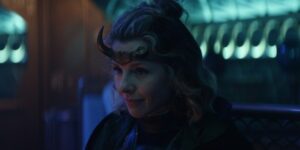
It wouldn’t be the TVA’s first shady deed. Sylvie later reveals that all of the organization’s millions of workers are Variants, whose memories of their former lives are deeply buried under layers of brainwashing and propaganda. Sylvie is able to briefly reconstruct an expensive resort restaurant from C-20’s memories during a trippy exchange accompanied by Hayley Kiyoko’s very apt “Demons”, but imagine if Sylvie – or Loki, with proper training – were to perform her trick on Mobius? I’d bet good money that in his past life, he was a jet-skier from the 1990’s.
Unfortunately, Sylvie’s attack on the TVA doesn’t go as planned, as Loki is forced to drag her through a time portal to escape from Renslayer. A lot happens in this sequence – which all takes place in the first few minutes of the upsettingly short episode – but Loki taking an opportunity to steal his daggers back from Hunter B-15’s locker, and Sylvie trying to use Loki’s life as leverage over Renslayer, only for the judge to encourage her to kill the God of Mischief, were definitely highlights of what I feel is only the warm-up to a much larger assault on the organization coming later in the series. Look back at the trailers, and there’s a shot of Renslayer standing on her desk wielding her baton that we still haven’t seen – so someone must get past her office’s gilded doors, and whatever they discover there will be huge.
The time portal unceremoniously deposits Loki and Sylvie on Lemantis-1, in the year 2077, shortly before a collision with a nearby moon is set to wipe out the purple planet’s entire civilization, unless they can escape upon a spaceship named the Ark. This survival quest gives the two characters plenty of time to bond and wear each other down a little – perhaps a little too much. Despite being given ample warning that “perverse fanfiction” would come out of the pairing, there’s still discourse around whether it’s problematic to ship what Twitter dubs “selfcest” – a thing that to the best of my knowledge is literally impossible in the real world barring any sudden advancements in cloning technology, and thus is not worth being alarmed about. That being said, Loki and Mobius are where it’s at, thank you very much.
In Mobius’ absence, however, I’ll give you that Di Martino and Hiddleston are loads of fun, and their dynamic is perhaps a bit more lively and energetic than Hiddleston and Wilson’s circuitous banter. Di Martino isn’t trying to parody Hiddleston right back at him, something that could easily have become grating: instead, her Sylvie has a world-weary frustration and cynicism that plays well off of Hiddleston’s nihilistic good cheer. There are some hilarious moments when the two accidentally discover a trait they have in common, such as when the two argue about who’s the most flagrantly hedonistic, but they also share a poignant outlook on love that comes with their timelessness, and an appreciation for sharp objects (although Di Martino carries a sword, and is a more efficient fighter all around – after shedding her burdensome cloak, ditching her tiara, and letting her hair down as she plunges into battle, she feels like she fully comes into her own).
The episode’s final battle, an experimental long-take sequence unusual for Marvel, is a beautiful display of both Sylvie and Loki’s magical abilities that makes me desperately want a video game based on the show, where a player could switch between the two characters. The frantic running and backtracking through the labyrinthine streets, the rotating camera movements, not to mention the central conceit of avoiding falling objects while progressing towards a prominent object in the middleground – the Ark – which blows up dramatically when a certain point is reached: all of it seems designed to mimic third-person gameplay, and it’s random yet glorious.
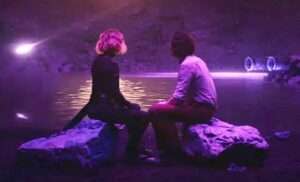
Unable to enjoy the visual splendor from their vantage point, Loki and Sylvie will have to find another way off of Lemantis-1 before it implodes. And with just three episodes left to go, I hope there’s enough time for them to explore the Multiverse that Sylvie created when she attacked the Sacred Timeline last week, while allowing for a satisfying conclusion to the mystery of the Time-Keepers. But the fact that Loki is all but officially confirmed to be getting a second season gives me hope that whatever happens, there’s more to explore in this bizarre, wonderful, corner of the MCU, and that by then Loki and Mobius will be the happy couple we honestly deserve.
Episode Rating: 9/10



